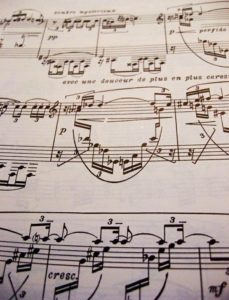 I have recently learned a new word. For all of the years that I have written, read, and spoken the English language, I had not heard this common word before.
I have recently learned a new word. For all of the years that I have written, read, and spoken the English language, I had not heard this common word before.
Earworm. (Do you know it?)
An “earworm” (borrowed from the German, ohrwurm) is a tune or bit of a song that plays and replays in your head, in an uninvited, automatic, spontaneous sort of way. All of us, I suppose, have suffered from the condition from time to time – a melody that somehow “gets stuck in your head.” One of my personal earworms is the theme song from The Jeffersons, that 1980s-era television comedy starring Sherman Hemsley. (If you can’t remember it, I could easily remind you.) At other times of day, A Mighty Fortress plays spontaneously.
Earworms are a biblical concept, I have come to think. The Scriptures recognize that there are very many melodies in the world that surrounds us, each vying for our attention. There are prideful melodies. There are self-important tunes. There unbelieving melodies, too. And there are hymns of glad surrender to the Person and the Cause of Jesus Christ. Our faith – and our lives – depend upon the melodies that capture our heart and attention.
Search your concordance for reference to “ears.” You will find the organ mentioned time and time again.
The prophets accused Israel of “stopping up their ears” (Zechariah 7:11). “Their ears are closed so they cannot hear. The word of the Lord is offensive to them; they find no pleasure in it” (Jeremiah 6:10).
Jesus wondered if his disciples might have “ears but fail to hear” (Mark 8:18). Throughout his ministry, he punctuated his teaching with the cry, “He who has ears to hear, let him hear” (Matthew 11:15; Mark 4:9; Luke 8:8, 14:35, etc.).
In the last days the church will suffer from “itching ears,” warns the Apostle Paul. “They will turn their ears away from the truth and turn aside to myths” (2 Timothy 4:3,4).
“Faith comes from what is heard.” Not from thinking. Not from our own effort or imagination. “And what is heard comes through the word of Christ” (Romans 10:17, NRSV). Martin Luther said famously, “The ear is the organ of salvation…”
What is it about ears?
Our ears swim (if you will pardon an awkward image) in an ocean of continual chatter – from television and radio music and talk, certainly, and chatter from the inside, too.
Sometimes self-importance and rebellion play in our ears. “Hath the Lord said?” the Serpent may whisper (Genesis 3:1). We may come to think that we know better than God himself – and close our ears to his sure command. “They… stopped their ears… in order not to hear the law and the words that the Lord of hosts had sent” (Zechariah 7:11,12, NRSV).
Sometimes fear and self-doubt play in our ears. We may come to “fear continually all the day” (Isaiah 51:12-13) – and close our ears to God’s dependable promises.
Sometimes resolute duty rings in our ears, in some dry rhythm without grace. We may come to forget that “the Lord waits to be gracious to you… He will surely be gracious to you at the sound of your cry.” We may come to ignore “a word [of grace!] behind you, saying, ‘This is the way, walk in it'” (Isaiah 30:18,19,21).
Let me recommend a radically alternative earworm.
“You are a royal priesthood“: you are appointed as heaven’s ambassador.
“You are a holy nation“: you are set apart for the purposes of the Almighty.
“You are God’s own people“: God has made you a member of his family.
And what is more, your royal, holy, chosen life has a purpose made in heaven: “that you may declare the praises of him who called you out of darkness and into his wonderful light” (1 Peter 2:9).
In New Testament times, I am told – before the invention of sitcom television – the people of God used to sing passages like these. They were New Testament earworms – the very kind, yes, to “get stuck in your head.”